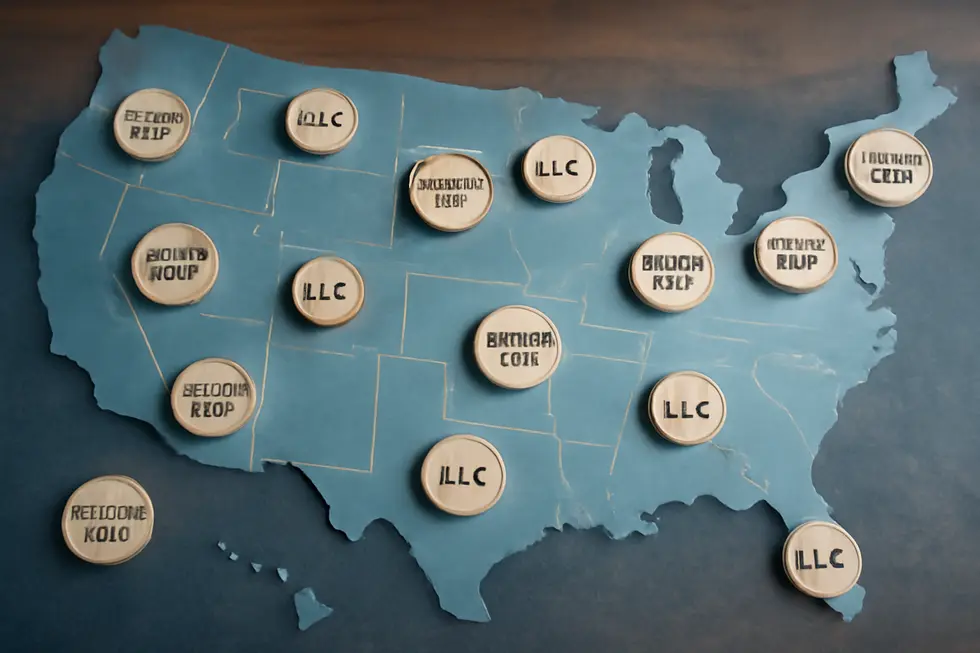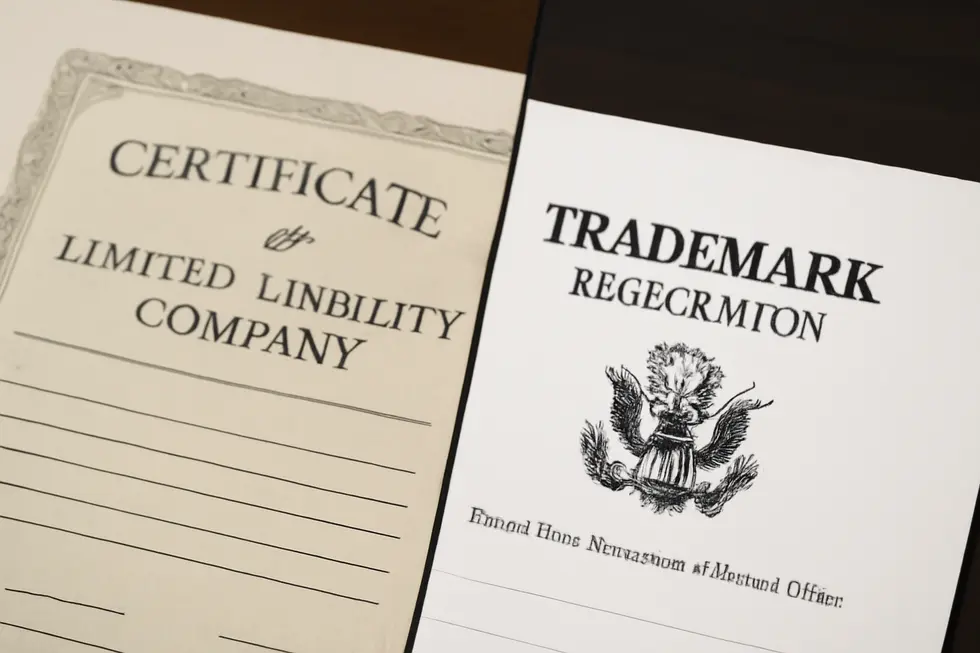Introduction
Choosing the right structure to protect your business name is a critical decision for business owners. Many assume that forming an LLC automatically safeguards their brand name, but the reality is more nuanced. An LLC primarily offers personal liability protection and registers your business name at the state level, yet this does not guarantee exclusive rights or nationwide protection for your name. This article explores how an LLC handles business name protection at the state level, compares LLC name registration with trademark rights, explains the limitations versus Doing Business As (DBA) names, and highlights the LLC’s role in securing your personal assets. Understanding these distinctions arm you with the knowledge to strategically protect your brand identity and business reputation.
Tables of Contents
Chapter 1: Does an LLC Protect Your Business Name at the State Level?
- How Registering an LLC Secures Your Business Name Within Your State
- Why LLC Name Registration Alone Isn’t Enough: Understanding State Limits and the Power of Federal Trademarks
- Navigating State-Level Name Availability and Reservation for LLCs
- Understanding the Limits of LLC Name Registration Versus the Power of Federal Trademark Protection
Chapter 2: Does an LLC Protect Your Business Name Nationwide?
- State-Level Protection Through LLC Registration: What It Covers and What It Doesn’t
- Beyond State Lines: How Federal Trademark Registration Secures Nationwide Business Name Rights
- Understanding Why Federal Trademarks Are Essential Beyond LLC Name Registration
- Beyond State Lines: Securing Nationwide Business Name Rights with Trademark Registration
Chapter 3: Does an LLC Protect Your Business Name Compared to Trademark Registration?
- State LLC Name Registration vs. Federal Trademark: The True Scope of Business Name Protection
- Understanding the Critical Differences Between LLC Name Registration and Nationwide Trademark Protection
- Why Federal Trademark Registration Secures Exclusive Nationwide Rights Beyond LLC Limits
- Navigating the Limits of LLC Name Protection and the Vital Role of Trademark Registration for Business Identity
Chapter 4: Does an LLC Protect Your Business Name Versus Doing Business As (DBA) Names?
- State-Level Exclusivity of LLC Names Compared to DBA Registrations
- Why LLC Registration Provides Stronger Name and Liability Protection Compared to DBAs
- State-Level Business Name Rights: How LLCs Differ from DBAs and Why Trademarks Matter
- Navigating LLC Name Protection and DBA Flexibility for Business Branding Strategies
Chapter 5: Understanding the Limits of LLCs in Protecting Your Business Name and Personal Assets
- How LLCs Provide State-Level Business Name Registration but Lack Nationwide Brand Protection
- Personal Asset Protection Benefits of an LLC Versus the Need for Trademarking Your Business Name
- Balancing Personal Asset Protection and Owner Privacy in LLC Formation
- Maximizing Business and Name Protection: Strategically Combining LLC Formation with Trademark Registration
Chapter 1: Does an LLC Protect Your Business Name at the State Level?

1. How Registering an LLC Secures Your Business Name Within Your State
Forming an LLC provides a key step in protecting your business name at the state level by officially registering it with the state government, usually the Secretary of State. This registration prevents other LLCs within the same state from adopting an identical business name, helping you maintain a unique identity and reducing customer confusion. Before submitting your Articles of Organization, it’s important to check name availability through the state’s online database and conduct a federal trademark search to avoid conflicts beyond the state. While this process grants exclusive rights to use the name for LLCs in that state, it does not extend to other business structures or states. Registering your business name through an LLC also establishes your company as a legal entity, granting limited liability protection and aiding in consistent branding across digital platforms. For those seeking to understand more about filing Articles of Organization and protecting business names via LLC, detailed guidance can be found in this comprehensive guide. Additionally, exploring trademark protection for business names can clarify the differences between LLC registration and broader brand safeguards.
2. Why LLC Name Registration Alone Isn’t Enough: Understanding State Limits and the Power of Federal Trademarks
Registering your business name as an LLC provides protection only within that state, preventing other LLCs from using the exact same name locally. However, this protection does not extend beyond state borders, meaning competitors in other states can legally use identical or similar names. It also does not guard against other entity types, like corporations, or DBAs that may mimic your name. Moreover, another business with established common law trademark rights might challenge your use within certain regions. Importantly, state registration offers no defense against federally registered trademarks, which hold nationwide priority and can require you to rebrand despite your LLC registration. To achieve comprehensive protection, federal trademark registration with the USPTO is essential. It grants exclusive national rights to your business name, allowing you to enforce them in federal court and deterring others from adopting confusingly similar names. This federal registration also supports future expansion and brand licensing. To avoid costly disputes and safeguard your brand fully, combining state LLC registration with federal trademark protection is the smartest course. For more insights on protecting your business name legally, visit trademark protection for business names and logos.
3. Navigating State-Level Name Availability and Reservation for LLCs
Registering your LLC name at the state level begins with searching the state’s business entity database, usually managed by the Secretary of State. This search confirms whether your desired name complies with naming rules—like including “LLC”—and isn’t already in use by another LLC in that state. While this step secures your business name against duplicates within the state’s LLC registry, it doesn’t guarantee broader protection.
To avoid conflicts beyond state boundaries, it’s wise to check trademarks via the USPTO database, since a federally registered trademark can preempt your use even if your LLC name is available locally. Additionally, verifying domain and social media name availability supports consistent branding but offers no legal safeguards.
If you’re not ready to form your LLC immediately, many states offer an option to reserve your desired name temporarily with a small fee, preventing others from registering it while you finalize your plans. The name becomes officially yours once you file your Articles of Organization, formalizing registration under state law.
For more on how trademark protection complements LLC registration, see this guide on trademark protection for business names.
Each state’s specific procedures and timelines vary—checking your Secretary of State’s website provides tailored guidance. For example, Michigan’s Department of Licensing and Regulatory Affairs offers detailed name availability searches and reservation options online.
4. Understanding the Limits of LLC Name Registration Versus the Power of Federal Trademark Protection
When you register your business name through an LLC, its protection is confined to preventing other LLCs from using that exact name within your state. This state-level safeguard ensures no identical LLC name can be registered locally, but it does not extend to other business structures or to operations beyond state borders. In stark contrast, federal trademark registration offers nationwide protection that covers your brand name, logo, and other identifiers across all states. A trademark grants exclusive rights to use and defend your brand wherever your goods or services are offered, supported by federal laws and courts. While an LLC name must include designators like “LLC,” trademarks protect the name as it appears to customers, without such suffixes. Moreover, trademarks enable legal remedies such as suing infringers and stopping counterfeit imports, privileges unavailable through LLC registration alone. To truly secure your brand’s identity and shield it from nationwide use by competitors, pursuing federal trademark registration is essential alongside your state LLC registration. For a detailed guide on setting up an LLC and comprehending name protections, see Northwest Registered Agent’s LLC formation guide.
Chapter 2: Does an LLC Protect Your Business Name Nationwide?

1. State-Level Protection Through LLC Registration: What It Covers and What It Doesn’t
Forming an LLC offers protection for your business name but only within the state where it is registered. This state-level protection means no other LLC can register an identical name in that jurisdiction, preventing duplication locally. However, this protection is limited to LLCs and does not extend to other business entities or operate beyond that state’s borders. Additionally, registering a DBA (Doing Business As) name provides no exclusive rights—it simply allows operation under an alternate name without legal safeguards against others using the same name.
To secure nationwide exclusivity for your business name, a federal trademark is necessary. Registered through the United States Patent and Trademark Office (USPTO), a trademark grants exclusive rights across all states, protecting your brand from use by others in related markets and giving you access to legal recourse in infringement cases. While common law rights provide some geographic protection based on actual business use, they are limited and unreliable for broad protection.
Therefore, while an LLC registration stops identical LLC name use within your state, it doesn’t provide nationwide brand security. For comprehensive business name protection, federal trademark registration is essential. For more details on distinguishing state registration from trademark protection, see this clear explanation by UpCounsel.
Learn more about protecting your business name with trademarks at trademark protection for business names and logos.
2. Beyond State Lines: How Federal Trademark Registration Secures Nationwide Business Name Rights
Forming an LLC registers your business name within your state, preventing other LLCs there from using the exact same name. However, this protection doesn’t extend beyond your state’s borders or cover other business types. While using your business name grants limited “common law” rights, these are geographically restricted and vulnerable to challenges elsewhere. To secure exclusive nationwide rights, registering your business name as a federal trademark with the United States Patent and Trademark Office (USPTO) is essential. Federal trademark registration establishes your priority date for use across the U.S. and empowers you to prevent others from adopting confusingly similar names nationwide. This registration also provides robust legal remedies, including suing infringers in federal court and pursuing statutory damages. Beyond these protections, a federal trademark guards against cyber squatters, supports business expansion, licensing opportunities, and acts as a foundation for international trademark claims. Thus, while your LLC safeguards your name within your state, federal trademark registration is critical for comprehensive, nationwide business name protection. For more detailed insights, explore the benefits of trademark registration at Benefits of a Trademark – UpCounsel.
3. Understanding Why Federal Trademarks Are Essential Beyond LLC Name Registration
Forming an LLC secures your business name only within the state where it is registered. This state-level protection prevents other LLCs from using the identical name locally but offers no control beyond those state boundaries. Consequently, LLC registration does not stop non-LLC entities or businesses in other states from adopting the same or a confusingly similar name. In contrast, federal trademark registration provides exclusive nationwide rights, enabling your business to legally prevent anyone in the U.S. from using your brand name or logo in commerce. This comprehensive protection supports business growth by allowing licensing, franchising, and enforcement in federal courts against infringement and cybersquatting. Unlike LLC registration, trademarks establish priority based on first use and registration, and after five years can become incontestable, further solidifying your claim. While an LLC name protects at a limited, local level, obtaining a federal trademark is critical for securing your brand’s identity across the country and defending it effectively. For a deeper dive into protecting your business name and logo via trademarks, see this comprehensive trademark protection guide. More details on the nationwide scope and benefits of trademarks are also available through expert resources such as UpCounsel’s explanation on trademark rights and enforcement.
4. Beyond State Lines: Securing Nationwide Business Name Rights with Trademark Registration
Forming an LLC secures your business name only within your state by preventing identical LLC registrations there, but it does not grant nationwide exclusivity. This state-specific protection does not stop other business entities or LLCs in different states from using the same or similar names. Though you gain personal liability protection through your LLC, your brand name remains vulnerable without broader safeguards.
To truly protect your business name across all states, federal trademark registration is essential. Registering a trademark with the United States Patent and Trademark Office (USPTO) grants exclusive rights nationwide, allowing you to prevent others from using confusingly similar names on related goods or services. Trademark registration also provides legal advantages, including stronger enforcement through federal courts and defenses against cyber squatting.
Practical steps include searching both state databases and the USPTO records to avoid infringement, then promptly applying for a federal trademark to establish priority. Reserving matching domain names further supports your brand’s online presence. Ongoing trademark monitoring is crucial to enforce your rights and maintain brand integrity.
While your LLC protects your name locally and shields personal assets, comprehensive brand protection depends on securing federal trademark rights. For detailed guidance, consulting a trademark attorney is advisable. For more insights on protecting your business identity, visit common law trademark rights.
(Source: https://www.jimersonfirm.com/blog/2025/09/when-should-i-register-my-business-name-as-a-trademark/)
Chapter 3: Does an LLC Protect Your Business Name Compared to Trademark Registration?

1. State LLC Name Registration vs. Federal Trademark: The True Scope of Business Name Protection
When you form an LLC, your business name is registered at the state level, reserving it exclusively for LLCs in that jurisdiction. This prevents another LLC from using the exact name within the same state but offers no protection beyond that boundary or against different business structures. In contrast, a trademark registration—either federally through the USPTO or at the state level—grants intellectual property rights that protect your brand name or logo in commerce more broadly. Trademark protection covers identical or confusingly similar marks and provides stronger legal enforcement, including the ability to bring federal lawsuits. Unlike LLC registration, trademarks safeguard your brand’s identity nationally (if federally registered) or within a state (via state registration), ensuring exclusive use and recognition. Moreover, trade names or DBAs do not offer exclusive rights and serve only as alternate public names. For businesses aiming to secure broad market presence and defend against brand infringement, obtaining trademark registration is crucial. This distinction underscores that while an LLC protects your business structure and name locally, it does not replace the comprehensive brand protection that trademarks provide. For further details on securing your business name through trademark protection, see trademark protection for business name and logo.
2. Understanding the Critical Differences Between LLC Name Registration and Nationwide Trademark Protection
Registering an LLC provides your business name protection only within your state. This state-level registration prevents other LLCs from using your exact name locally but does not grant intellectual property rights or exclusive use beyond that jurisdiction. Moreover, it does not stop non-LLC entities or businesses in other states from using the same or similar names. Conversely, trademark registration establishes a federally recognized intellectual property right that protects your business name nationwide. With a federally registered trademark, you gain exclusive rights to your brand identity, including names, logos, and slogans, enabling you to legally prevent others from using confusingly similar marks in commerce across the country. While common law trademark rights offer some geographic protection based on actual use, they are limited and weaker than federally registered trademarks. Trade names or DBAs, often registered for marketing purposes, provide no legal exclusivity or intellectual property protection. For comprehensive brand security, forming an LLC for legal and tax benefits should be paired with a trademark registration, ensuring nationwide protection and stronger enforcement options against infringement. For more details on intellectual property distinctions, refer to common law trademark rights and official USPTO guidance.
3. Why Federal Trademark Registration Secures Exclusive Nationwide Rights Beyond LLC Limits
Forming an LLC offers only state-level name registration, preventing identical LLC names within that state but not granting exclusive rights nationwide or against other business types. While common law trademarks arise from actual use, their protection is geographically limited and vulnerable to conflicts when expanding or operating online. Federal trademark registration, however, provides robust nationwide protection under the USPTO, granting priority over others’ use of confusingly similar names across all states from the registration date. This exclusive right enables enforcement through federal courts, ensuring stronger remedies against infringement, public notice to deter imitators, and potentially incontestable status after five years. Early federal registration is essential for businesses planning growth beyond local markets, guarding against costly disputes and enhancing brand credibility. Before filing, a comprehensive search is critical to avoid conflicts. Consulting a trademark attorney can ease navigation through complex applications and protect your asset fully. In contrast to LLC registration’s limited scope, securing a federal trademark is key for enduring exclusive rights to your business name nationwide. For a deeper understanding of trademark protection, visit this trademark protection for business name and logo.
4. Navigating the Limits of LLC Name Protection and the Vital Role of Trademark Registration for Business Identity
An LLC primarily offers personal asset protection by registering your business entity at the state level, which includes reserving your business name within that state. However, this reservation only prevents other LLCs from using the same name locally—it does not guarantee exclusivity beyond state borders or among other entity types. Consequently, businesses in other states or different business structures might legally use identical or similar names.
To secure nationwide and enduring rights to a business name, trademark registration is essential. Filing with the United States Patent and Trademark Office (USPTO) grants exclusive legal rights, preventing confusingly similar uses across the country and protecting your brand identity. While DBAs can offer marketing flexibility by allowing alternate names, they provide no legal exclusivity or protection.
Entrepreneurs should consider forming an LLC first to protect their personal assets, then pursue trademark registration to safeguard their business name comprehensively. This dual strategy secures both liability protection and brand exclusivity, essential for long-term business success. For more details on trademarking business names, see this resource on trademark protection for business names and logos.
Additional guidance on trademark timing and benefits can be found at USPTO’s detailed blog.
Chapter 4: Does an LLC Protect Your Business Name Versus Doing Business As (DBA) Names?

1. State-Level Exclusivity of LLC Names Compared to DBA Registrations
Forming an LLC grants your business name exclusive protection within the state of registration. This exclusivity prevents other LLCs in the same state from using the exact name, embedding your business name in official documents, contracts, and tax filings as your legal identifier. Conversely, a DBA (Doing Business As) only serves as an alternate name for marketing purposes and does not create a separate legal entity. Registering a DBA allows operating under a different name but offers no exclusive rights; other businesses may register identical or similar DBA names without restriction. Notably, while you can maintain multiple DBAs under one LLC, none provide legal exclusivity unless paired with trademark registration. Ultimately, an LLC name’s protection is limited by state boundaries and legal structure, whereas DBAs focus on branding without legal safeguards. For entrepreneurs aiming for stronger, nationwide exclusivity over their business name, securing a trademark is essential. For more details on the distinctions in legal name protection, see SmallBizTrends on Legal Business Name.
2. Why LLC Registration Provides Stronger Name and Liability Protection Compared to DBAs
Forming an LLC grants your business name exclusive registration within your state, preventing other LLCs from using the same or confusingly similar names. This state-level exclusivity helps establish your brand identity specifically among LLC entities. In contrast, a DBA (Doing Business As) simply allows a business to operate under a different name without creating a separate legal entity. While you must register a DBA locally, it does not guarantee exclusive use beyond that jurisdiction. Moreover, DBAs do not offer liability protection, leaving personal assets vulnerable to business debts or lawsuits. An LLC establishes a distinct legal entity that separates your personal assets from business obligations, crucial for risk management. However, neither an LLC nor a DBA registration confers federal trademark rights, which are necessary for nationwide name protection and legal enforcement against infringement. For comprehensive brand protection, pursuing trademark registration is essential. Understanding these distinctions clarifies why an LLC is often a more robust choice for securing your business name and shielding your personal assets compared to relying solely on a DBA. For further insights, explore detailed guidance on LLC name availability and DBA registration here.
3. State-Level Business Name Rights: How LLCs Differ from DBAs and Why Trademarks Matter
When you form an LLC, your business name becomes a registered legal entity name within the state, offering exclusive rights to that name against other LLCs. This registration prevents identical or confusingly similar LLC names from being used locally and establishes your business in legal documents and contracts. Conversely, a Doing Business As (DBA) name is merely a registered alias used for marketing or operational purposes. It does not create a separate legal entity or provide any exclusivity, leaving room for other businesses to use the same or similar trade names. Importantly, neither an LLC name nor a DBA confers trademark protection. To secure your business name as intellectual property nationwide—preventing others from legally using or infringing on it—you must register a federal trademark with the USPTO. This trademark extends protection far beyond state borders and across various business types. Many entrepreneurs combine LLC formation for liability and legal recognition with DBAs for brand flexibility, but federal trademark registration remains essential for comprehensive name protection. Learn more about how trademarks safeguard your business identity at trademark protection for business names and logos. For further insights on LLC vs. DBA name protection and trademark law, visit https://staterequirement.com/llc/llc-name-vs-trade-name/.
4. Navigating LLC Name Protection and DBA Flexibility for Business Branding Strategies
When you establish an LLC, your business name gains state-level protection by registering as a unique legal entity, preventing other LLCs in that jurisdiction from using the same name. This formal registration secures your legal identity and shields personal assets from business liabilities. Conversely, a Doing Business As (DBA) name acts as an alias or trade name, allowing a business—including an LLC—to operate under different names without forming separate entities. While DBAs offer branding versatility and market expansion opportunities, they do not provide exclusive rights or personal liability protection. Entrepreneurs often leverage this by registering multiple DBAs under a single LLC, enabling diverse business lines or brands under one legal umbrella. However, it’s important to note that all DBAs share the LLC’s EIN and liability, meaning risks are not siloed. To secure exclusive and nationwide rights over a business name, trademark registration remains essential beyond LLC and DBA filings. For detailed advice on structuring multiple businesses under one LLC with DBAs, see this guide on structuring multiple businesses. For understanding legal brand protections beyond LLC and DBA registration, explore trademark considerations in our resource on trademark protection for business names.
Chapter 5: Understanding the Limits of LLCs in Protecting Your Business Name and Personal Assets

1. How LLCs Provide State-Level Business Name Registration but Lack Nationwide Brand Protection
Forming an LLC offers valuable personal asset protection by legally separating your liabilities from your personal finances. When you register an LLC, your business name is also registered with the state, preventing other LLCs within that jurisdiction from using the identical name. This state-level registration effectively restricts duplication among LLCs in the same state but does not extend protection beyond state boundaries. Other business structures, like corporations or sole proprietorships, may still use the same or similar names, especially if they operate in different states. To secure exclusive, nationwide rights to your business name, you must obtain a trademark from the United States Patent and Trademark Office (USPTO). A federal trademark grants legal authority to enforce your name’s exclusive use across all states and provides access to federal courts for infringement disputes. Without a trademark, your LLC’s name protection remains confined to your registration state and limited to the LLC business structure. Thus, while an LLC is crucial for asset protection and state-level name registration, full brand security requires trademark registration. For further insight on how trademarks safeguard your business identity, learn more about trademark protection for business names and logos.
2. Personal Asset Protection Benefits of an LLC Versus the Need for Trademarking Your Business Name
An LLC primarily offers personal asset protection by legally separating the business’s debts and liabilities from the owners’ personal property. This means that, if the business faces lawsuits or creditors, owners’ personal assets like homes and savings are typically shielded, assuming proper business formalities are maintained. Importantly, this protection depends on keeping business and personal finances separate and following the LLC’s operating agreement where applicable. However, the LLC’s reservation of your business name is limited solely to state-level recognition and only blocks other LLC registrations within that state from using the same name. This form of name protection does not extend to other business structures or to businesses operating in different states. To secure nationwide and exclusive rights to your business name, registering a trademark with the U.S. Patent and Trademark Office is essential. Trademark registration empowers you to enforce your brand identity legally and prevent others from using similar marks. Maintaining your LLC and understanding these boundaries help protect your personal assets, but full brand name security requires trademark registration. For further details on protecting a business name beyond LLC registration, see this comprehensive guide on trademark protection for business names and logos. More thorough advice about LLC asset protection is available from resources like SmallBizTrends.
3. Balancing Personal Asset Protection and Owner Privacy in LLC Formation
While forming an LLC effectively separates your personal assets from business liabilities, it does not inherently secure your business name beyond state-level registration. The personal asset protection an LLC provides shields your home, savings, and other assets from business debts and legal claims, except in cases of fraud or personal guarantees. Importantly, LLC ownership disclosure requirements vary significantly by state, affecting owner privacy. States like Wyoming, Nevada, and Delaware enable a high degree of anonymity by not mandating public disclosure of members’ identities, allowing owners to maintain privacy and limit public exposure. Employing registered agents and holding interests through trusts can further enhance anonymity, although full confidentiality is never guaranteed everywhere. However, these anonymous LLCs tend to be more costly and complex to maintain and may trigger additional regulatory scrutiny in financial dealings. Understanding these nuances is crucial for business owners seeking both liability protection and privacy. For a deeper exploration of LLC privacy strategies alongside asset protection, resources like BusinessAnywhere.io offer comprehensive guidance. For more on protecting your business name through intellectual property, see this detailed article on trademark protection for business names and logos.
4. Maximizing Business and Name Protection: Strategically Combining LLC Formation with Trademark Registration
Forming an LLC provides essential protection by separating your personal assets from business liabilities, shielding your home, savings, and investments from lawsuits or debts tied to the company. However, this protection applies strictly to your personal assets and only limits business name duplication within your state for LLCs. It does not grant exclusive or nationwide rights to your business name, nor prevent other entities or businesses in different states from using the same or similar names. To secure exclusive use of your business name across the country, registering a trademark with the U.S. Patent and Trademark Office is critical. This grants nationwide legal rights and enables enforcement against infringers. A wise approach is to first establish your LLC for liability protection, optionally register a DBA for marketing names, and then file for federal trademark registration to lock in exclusive brand identity. Early trademark application establishes priority and strengthens your legal position as you expand. Maintaining both LLC compliance and trademark renewals ensures ongoing protection. This layered strategy offers comprehensive security by safeguarding personal assets and securing your business name against unauthorized use. For detailed guidance on protecting your business name, refer to this trademark protection resource. More on trademark advantages can be found in external expert guides.
Final thoughts
Forming an LLC is an important step for business owners seeking to protect their personal assets and establish a legal identity for their company. However, when it comes to protecting your business name, an LLC offers limited safeguards—primarily restricting identical LLC names only within your state. To secure exclusive nationwide rights and prevent others from using your brand, federal trademark registration is essential. Additionally, DBAs provide a flexible marketing name but no legal exclusivity. Understanding these distinctions ensures that your business name and brand receive the proper protection needed to thrive and avoid costly disputes. Use your LLC as a foundation for personal protection, and complement it with trademark registration to fully safeguard your valuable brand identity.
Your IP is the foundation of your success – let’s protect it together before it’s too late. We can’t wait to help you turn your ideas into legally secured assets.
About us
undefined


